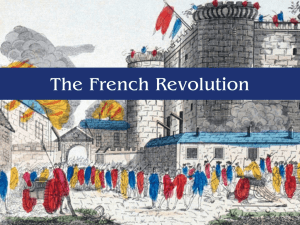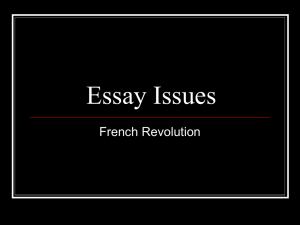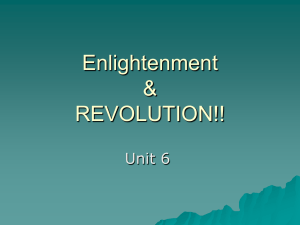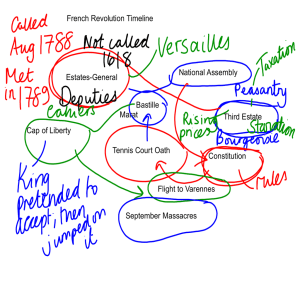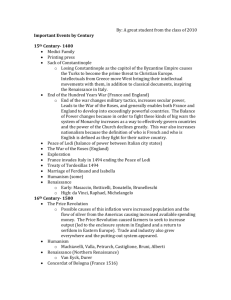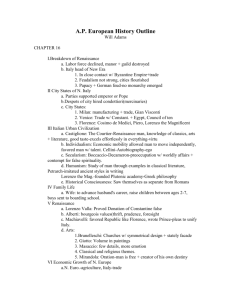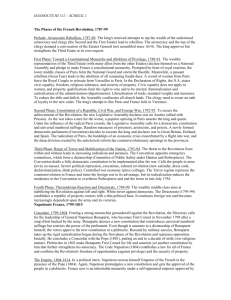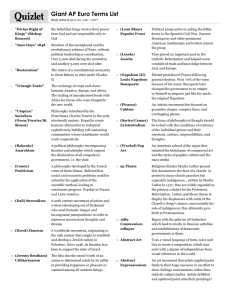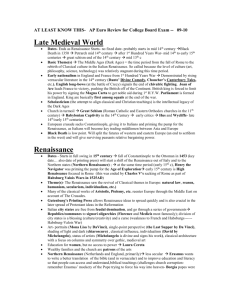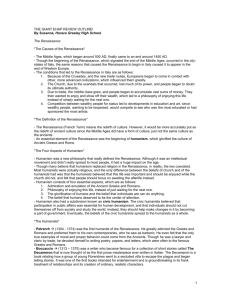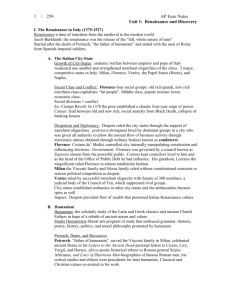on to the french revolution!!!
advertisement
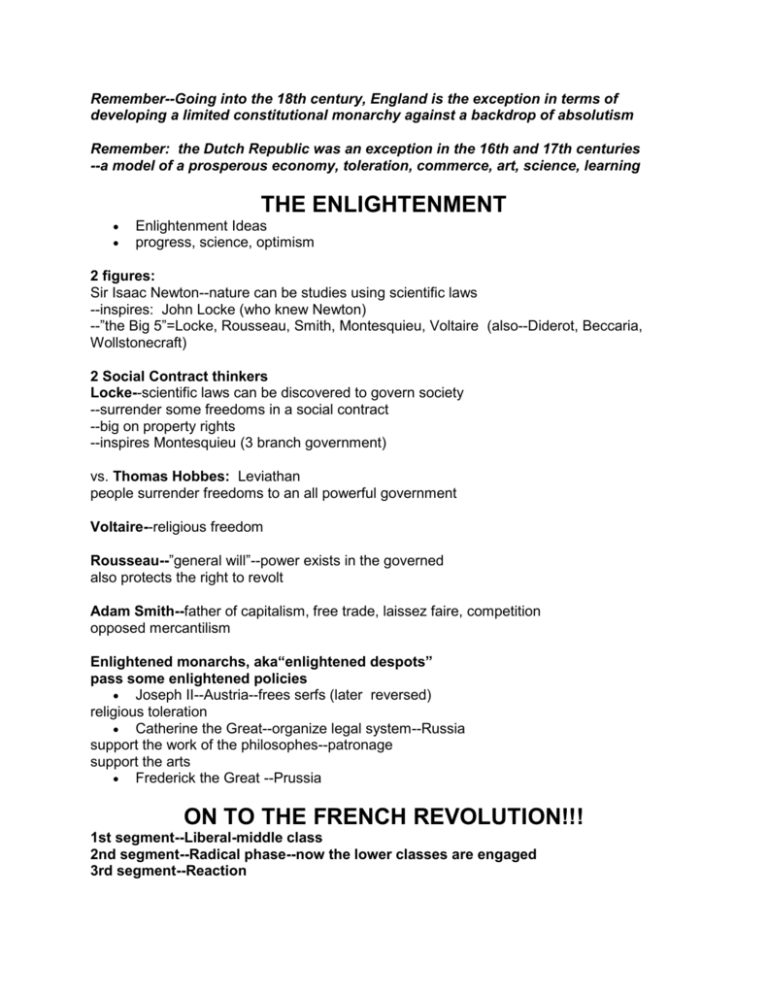
Remember--Going into the 18th century, England is the exception in terms of developing a limited constitutional monarchy against a backdrop of absolutism Remember: the Dutch Republic was an exception in the 16th and 17th centuries --a model of a prosperous economy, toleration, commerce, art, science, learning THE ENLIGHTENMENT Enlightenment Ideas progress, science, optimism 2 figures: Sir Isaac Newton--nature can be studies using scientific laws --inspires: John Locke (who knew Newton) --”the Big 5”=Locke, Rousseau, Smith, Montesquieu, Voltaire (also--Diderot, Beccaria, Wollstonecraft) 2 Social Contract thinkers Locke--scientific laws can be discovered to govern society --surrender some freedoms in a social contract --big on property rights --inspires Montesquieu (3 branch government) vs. Thomas Hobbes: Leviathan people surrender freedoms to an all powerful government Voltaire--religious freedom Rousseau--”general will”--power exists in the governed also protects the right to revolt Adam Smith--father of capitalism, free trade, laissez faire, competition opposed mercantilism Enlightened monarchs, aka“enlightened despots” pass some enlightened policies Joseph II--Austria--frees serfs (later reversed) religious toleration Catherine the Great--organize legal system--Russia support the work of the philosophes--patronage support the arts Frederick the Great --Prussia ON TO THE FRENCH REVOLUTION!!! 1st segment--Liberal-middle class 2nd segment--Radical phase--now the lower classes are engaged 3rd segment--Reaction Why? debt, nobles not getting taxed, no govt. revenue, + new ideas --Enlightenment, famine Louis XVI--ineffective king. Louis marginalizes nobles rather than working with them. fiscal crisis--Estates General called by Louis XVI (believes they’ll vote his way!) voting--by estate (1st, 2nd, and 3rd) BUT… 3rd Estate--creates the National Assembly--Tennis Court Oath--demand for a Constitution --Storming of the Bastille-carried out by ordinary people --National Assembly dominated by bourgeoisie --they want, therefore, LIBERAL change vs. (radicals, peasants, etc.)--point--this is a middle class revolution --write the Declaration of the Rights of Man --begin to talk of economic reform --demand loyalty oath--Civil Constitution of the Clergy--this fires up more controversy (meanwhile--famine gets worse) March on Versailles-by French women Louis XVI--tries to flee to Austria --which angers the people AT THIS POINT, THE RADICALS START TO RUN THE SHOW (1792-1794) Louis XVI is captured and executed National Convention formed--ruled by the Committee of Public Safety (kind of like the executive branch)--went after enemies of the Revolution--they dechristianize France, introduce calendar, the Cult of the Supreme Being --Robespierre is inspired by Rousseau’s idea of the General Will --Robespierre misreads the masses, who want more stability and order --Robespierre is executed NAPOLEON MEANWHILE--Austria has declared war on the French--the French Revolution alarms monarchs these wars instill nationalism: among the French the Directory--corrupt, ineffective replaced in 1799 by Napoleon--1st Consul, then Emperor Napoleon’s achievements: was he an enlightened despot? opinions vary. Napoleonic Civil Code (some liberal--which appeals to middle class) banking system--stabilizing the economy rebuilds Paris--puts people to work advent of public education in France--the Lycees Concordat of 1801 MEANWHILE--neoclassical art, Jacques Louis David’s giant murals, somewhat propagandistic Napoleon’s Wars --successful early on-spreads himself too thin invades Russia defeated, returns, defeated again, and then exiled INDUSTRIAL REVOLUTION Economics Agricultural Revolution--late 1600s Enclosure movement--more efficient, leads to crop rotation, better fertilizer, more food--so food prices go down THEN cottage industry--putting out system--first division of labor BUT its still inefficient SO--this leads to the factory key innovation: steam engine Industrial revolution textiles first (soft goods) division of labor in factory cheap wages thinkers who argue for cheaper wages for factory workers: David Ricardo--Iron Law of Wages Malthus--population growth emergence of consumer revolution--fueled by cheaper products + the Atlantic System: as people have more money the demand growth responses to new problems: hours, wages, conditions, poverty Government reforms--women, children--hours, working conditions Great Reform Bill of 1832--widens vote--this expands--wider circle of voting power--more from the lower classes, who will ultimately demand more from government Comparing the regions France and the Continent industrialize later, only after the chaos of revolution and war key feature: England--entreprenurial capitalists Continent--government support, investment (which means continental countries can industrialize rapidly) Rise of Isms: ideology socialism--protests working conditions romanticism--responds against destruction of nature early socialists--”utopian socialists” --like a commune--Blanc, Fourier, Owen--disagreed too much to unify and organize (later socialists will organize much more effectively) socialists will later mobilize the working classes--growth of modern political parties, mass culture, mass politics CLASH OF THE ISMS!!!! conservatism: Congress of Vienna in 1815--monarchs of Europe achieve some degree of consensus about ruling in Europe --the “Concert of Europe” (remember--a lot of people welcomed this because it promised some stability and order) BUT multiple revolts and revolutions take place--liberal and nationalistic Belgium--okay--monarch is on board Greece--weakens the Ottomans + hey, it’s classical Greece 1820s: several uprising ie, German student movement which is liberal and nationalistic is 2 French Revolutions--liberal France 1830 Louis XVIII--Constitutional Monarch, then Charles X--who want no constitution-liberal revolt in 1830--replaced with Louis Philippe--a favorite of wealthy businessmen 1840s: the Hungry Forties--series of bad harvests, famine 1848: revolution in France, Provisional Government --National Workshops (very popular)-they are popular AND expensive--the govt. shuts them down--so, another REVOLT-and then, Napoleon III comes into power In central Europe, the 1848 revolutions are nationalistic and they all fail. RISE OF THE NATION-STATE: mid to late 19th century the push toward order responsive national states, governments avoid revolution through reform and public policies **CHANGE FROM ABOVE, which allows for greater control Examples RUSSIA Alexander II--frees serfs, starts to talk of reform, but assassinated by radicals-the People’s Will “Bread and Land” Alexander III--reactionary--expels radicals, oppressive policies, BUT he does rapidly industrialize Russia--rail, factories (Russia plays catch-up) ITALY Count Cavour (Piedmont and Sardinia) --unifies Italy from North (Garibaldi from the South) opposed the Pope, France, and Austria! GERMANY German unification--Zollverein already failed unification in 1848 “Crown from the Gutter” Bismarck--Prussia “Blood and Iron” fights 3 wars to unify Germany: Denmark, Austria, France (1871) Franco Prussian War 1871--Alsace and Lorraine Napoleon III-in exile, and will die in England Bismarck --social welfare --opposed Social Democrats (socialists) --prevents revolution --controversy--tries to oppress Catholic church--Kulturkampf Bismarck--realpolitik, cautious diplomacy, careful about alliance AFTER Bismarck--German foreign policy is more reckless--helps to lead to WWI FRANCE Napoleon III rebuilt Paris, sewer system, Haussmanization!, widens streets, helps to industrialize France Positivism: order and stability will bring out positive improvement for France will declare himself Emperor gets entangled in foreign affairs ENGLAND: 18th century--series of weak German-born/related kings increasing power of Parliament increasing power of Prime Minister Reforms: Government adapts with continual reforms, expansion of the vote 1867--AUSTRIA HUNGARY creation of the Dual Monarchy by this time Europe is saturated--therefore need to expand empire MEANWHILE: ART!! from Romanticism to Realism (paint ordinary life as it is), Gustave Flaubert--then moves on to impressionism, post impressionism, expressionism THE NEW IMPERIALISM make colonies a political part of your empire NEW IMPERIALISM Motives God: White Man’s Burden--paternalism Glory--balance of power Gold--expand markets key events India--taken over by British by the 1850’s Africa Scramble for Africa Bismarck 1884--Berlin Conference to set the game rules to avoid war Suez Canal--makes north Africa really important--site of competition Belgian Congo King Leopold--human rights abuses --rubber industry REMEMBER: THE CRIMEAN WAR? it embarrassed every European power involved everybody realized they needed to modernize their military (remember that the second industrial revolution emphasized iron, steel, heavy industry therefore, they try out these weapons on native resistance the Boer War will notably feature the use of the machine gun (also--first concentration camp) World War I the MAIN causes militarism, alliances--get tangled, imperialism, nationalism--the assassination of Franz Ferdinand Serbia--hope for a greater Serbian state Austria annexes Bosnia series of Bosnian War June 1914 Franz Ferdinand assassinated--the alliance system Austria--declares war on Serbia Germany provides support Russia mobilizes against Germany and Austria Germany declares war on Russia France drawn in Belgium invaded, and puts up resistance--brings in England trench warfare The war Kaiser abdicates Weimar Government formed


